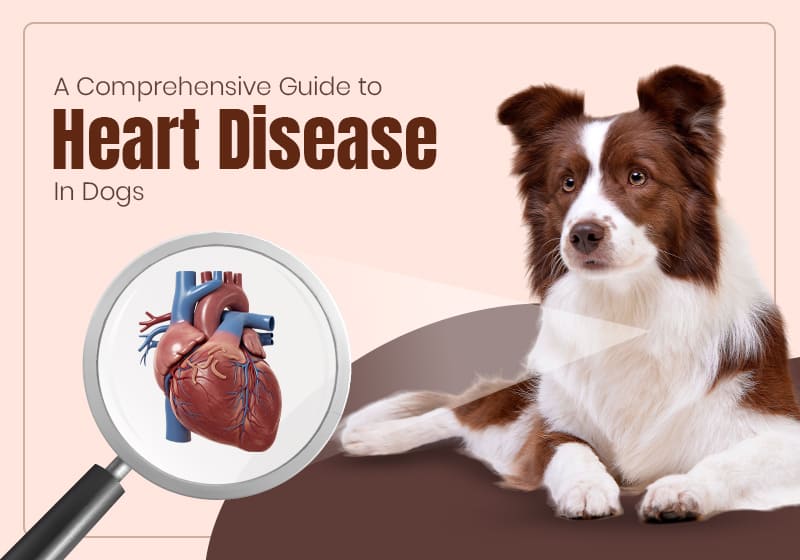
Dogs offer unwavering kindness and unconditional love to us, but we often fall short of doing enough to keep their loyal hearts protected. Dog hearts, too, require proper care, as they are susceptible to heart disease throughout their lives.
In this blog, we will explore everything about heart diseases in dogs, including types, symptoms, and prevention, so you can educate yourself and enjoy more time with your furry companion. Let’s get started!
Understanding Heart Disease in Dogs
Heart disease is a potentially fatal health condition, affecting 1 in every 10 dogs globally. The illness includes multiple heart conditions, either congenital (from birth) or acquired (developing over time due to infections, lifestyle, aging, etc.).
The heart is a key organ in the dog’s body. Pumping oxygenated blood to different organs of the body and pumping deoxygenated blood to the lungs for cleaning are a couple of its key functions. It has four primary components, i.e., the heart muscle, valves, the pericardium, and the electrical conducting system. A dog suffering from Heart disease suffers from a deteriorated pumping ability of the heart, causing life-threatening damage when left unattended. Therefore, it is essential to detect the condition early and follow necessary prevention tips, tailored according to individual dog needs.
Types of Heart Diseases in Dogs
Heart diseases can be divided into two categories: Acquired and Congenital. Let’s have a look at them:
Acquired Heart Diseases
- Heartworm Disease: Heartworm disease is spread through an infected mosquito bite, which transfers disease-causing worms into the pet’s bloodstream. Mature worms live inside the heart and associated blood vessels, causing the deadly heartworm disease.
- Mitral Valve Disease: Mitral Valve disease occurs when the heart’s mitral valve fails to close properly, facilitating blood to move backwards through the valve opening. When this regurgitation becomes severe, it leads to fluid accumulation in the lungs, causing arrhythmias or congestive heart failure.
- Cardiomyopathy: Cardiomyopathy occurs when heart muscles become weak and are unable to contract or pump blood properly. This results in enlargement of heart chambers, causing leaky valves, congestive heart failure, and in severe cases, sudden death.
- Pericardial Effusion: Pericardial Effusion happens when the sac around the heart is filled with fluid, disrupting the heart’s normal function. It leads to breathing difficulty and weakness, requiring immediate veterinary attention.
Congenital Heart Diseases
- Subaortic Stenosis: Subaortic Stenosis is a sub-condition of Aortic Stenosis, which leads to the narrowing of the aorta. It causes the heart to work harder to pump blood, eventually making the heart muscles thick and weak.
- Patent Ductus Arteriosus: This is a condition in which the opening between the two major blood vessels of the heart does not close properly before birth. Consequently, it leads to improper oxygenation of the blood, which can cause heart failure.
Common Symptoms of Canine Heart Diseases
Dogs exhibit a range of signs when suffering from heart disease. Some of the common ones are mentioned below:
- Persistent cough
- Breathing difficulty
- Lethargy or weakness
- Weight loss
- Changes in behavior
- Diarrhea or vomiting
- Difficulty in sleeping
- Abdominal swelling
- Increased urination
- Exercise intolerance
Simple Prevention Tips for Heart Disease
Although not all canine heart diseases are treatable, some can be managed with the right approach. Here are a few ways that can help you manage the condition:
- Early diagnosis: Early diagnosis is the best way to prevent the development of the disease and manage it effectively. When the condition is detected early and treated appropriately, it can add years to your dog’s life and keep them hale and hearty.
- Regular vet visits: Taking your canine companion for routine vet visits will not only help in the early detection of any disease, if any, but will also offer proper treatment on time to ensure your dog lives a healthy and long life.
- Preventive treatments: It is essential to administer heartworm preventive treatments to stop the worms from causing trouble to your companion. Heartgard Plus, Simparica Trio, Interceptor Plus for Dogs, etc, are some of the popular and effective treatments to prevent heartworm disease.
- Balanced diet: A healthy diet, low in sodium and filled with essential nutrients and Omega-3 fatty acids, keeps the heart healthy and reduces the risk of heart disease. You can consult the veterinarian for tailored recommendations regarding your dog’s nutritional requirements.
- Regular exercise: Regular exercise helps maintain a healthy weight and reduces the strain on your dog’s heart. You can consider taking your pooch for swimming, running, hiking, etc. Make sure you do not overexert your dog and follow moderate exercises to keep them active.
Also Read: Heartworms: Know Everything About Heartworms & Prevention Methods
Wrapping Up
Heart diseases in dogs can be life-threatening, but with the right approach and a few lifestyle modifications, you will be able to manage and prevent the condition efficiently. You can adopt the most suitable method, ranging from weight management to preventive treatments, and ensure the overall well-being of your furry companion in the long run.
